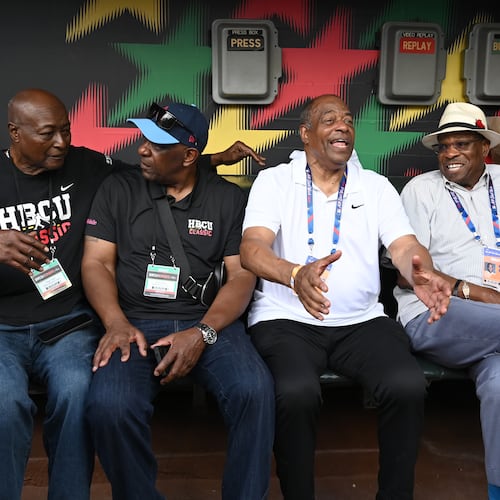Braves third base coach Ron Washington, at age 68, is comfortable coaching this season because he has faith in Major League Baseball and himself.
Washington falls under the high-risk category amid the coronavirus pandemic. He could’ve opted out of the season or perhaps even coached digitally rather than be physically present. But he couldn’t willingly step away from the sport in which he’s been involved over four decades.
“I trust Major League Baseball, the protocols they have,” Washington said. “But I also trust me. I’m going to make certain that I do everything I have to do to make certain I can make it through this 60-game season, the playoffs if all that’s possible, and get home safely. So I’m masking up too. I’m doing everything I have to do. I’m staying distant from people. I’m only getting out when it’s time to go to the store. My process is to the house, to the ballpark, to the house, to the ballpark.
“My wife allowed me to make that decision. Most wives, with this COVID-19 out here, would want their loved ones home, but she knows this is what I do for a living. She knows how much I love it. She trusts me to do what I have to do to stay safe.”
The Braves have already had three individuals decide against participating this season. Starter Felix Hernandez opted out. Outfielder Nick Markakis chose not to play. First base coach Eric Young Sr., who’s high risk, also opted out.
Those announcements came after the Braves announced four players – Freddie Freeman, Will Smith, Touki Toussaint and Pete Kozma – had tested positive for COVID-19 on July 3. The news cycle has quieted since, with manager Brian Snitker recently saying it’s starting to feel like more normal pre-season training again.
“It took a couple days and we’re back to where we were when we left spring training,” Washington said. “As far as our legs, hands, the way we’re moving around, I feel pretty good about where we are right now.”
The Braves have been in camp for nine days. Like the rest of baseball, they’re growing accustomed to the sport’s extensive health and safety protocols. The rules have completely changed players’ and coaches’ daily lives, with Markakis even mentioning that his decision not to play was influenced by how the protocols affected his preparation.
Washington is proud of how his players have handled the new realities. He stressed one primary reason he feels so safe is because of the maturity of the roster and how they’re approaching unprecedented conditions.
“Our young kids are class acts,” he said. “I think they’ve proven that the past couple years in the way they go about their business and the way they play the game of baseball. They know what’s at stake here and they’re taking it seriously. You hear about other teams around the league and how they’re having problems, but here we haven’t been having any problems. That’s because our young kids have really, really, really been making certain that when they’re away from the ballpark, they take care of themselves. When they come to the ballpark, they take care of themselves.”
Washington continued, explaining he feels safer at Truist Park than anywhere else because of the widespread guidelines.
“This is very safe. You don’t get in here unless you’re negative, and that’s the good thing. They check you in and once you get in here, the training staff and medical staff that’s here, they’re like hawks. They’re around making certain guys are doing what they’re supposed to do. Sometimes you get out there and you might get a little lax, but there’s always someone in your ear making certain that you’re getting back into the protocol. It’s going to be different, but in the end, it’s baseball. I personally feel the safest place right now is at the ballpark.”
During months of house chores, constant TV and movie watching, and infrequent trips to the grocery store, Washington made life-style changes. He said he hasn’t smoked a cigarette since leaving the team’s facilities in North Port, Florida, on March 13.
Life, like baseball, is all about the adjustments, he says.
“I hadn’t had a single cigarette,” Washington said. “It’s mind over matter. I’ve been a strong willed, strong minded person my whole life. You have to do what you have to do. Life is changing and you just have to go with it. Hopefully the day will come that we’re back to normal soon.
“This is serious business. I’m just trying to keep myself as safe as I possibly can. I’m pleased with where I am right now. … Whatever adjustments you have to make, make. The game of baseball is about readjusting, adjusting and readjusting. It never stops. Life is in the same pattern.”
Washington joined the organization in October 2016 as Snitker’s third base coach. He’s been instrumental in the team’s turnaround, acclaimed for his defensive expertise, lively leadership, infectious enthusiasm and ability to relate to players.
Several Braves, especially second baseman Ozzie Albies, have developed tight bonds with Washington. He possesses a renowned track record in teaching infield defense, and the organization has largely credited him for its sterling defensive play across the past two division-winning seasons.
“Wash means everything to our team,” Albies said. “Not just me, but to our team. He does his best to get everybody ready at what we do. Better feet, better hands. He makes stuff happen. He makes magic happen with a lot of guys. I see it.”
Washington was a finalist for the Padres managerial job last offseason. He hasn’t managed since his tenure with the Rangers (2007-14), during which the club made the postseason three times and won its only two American League pennants.
About the Author
Keep Reading
The Latest
Featured



